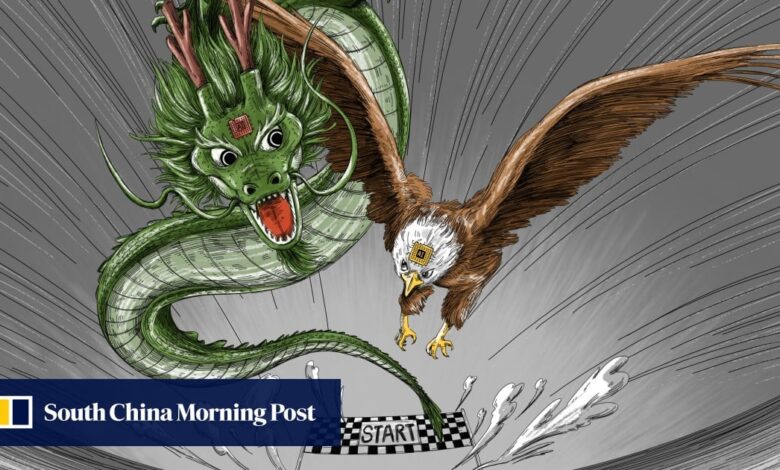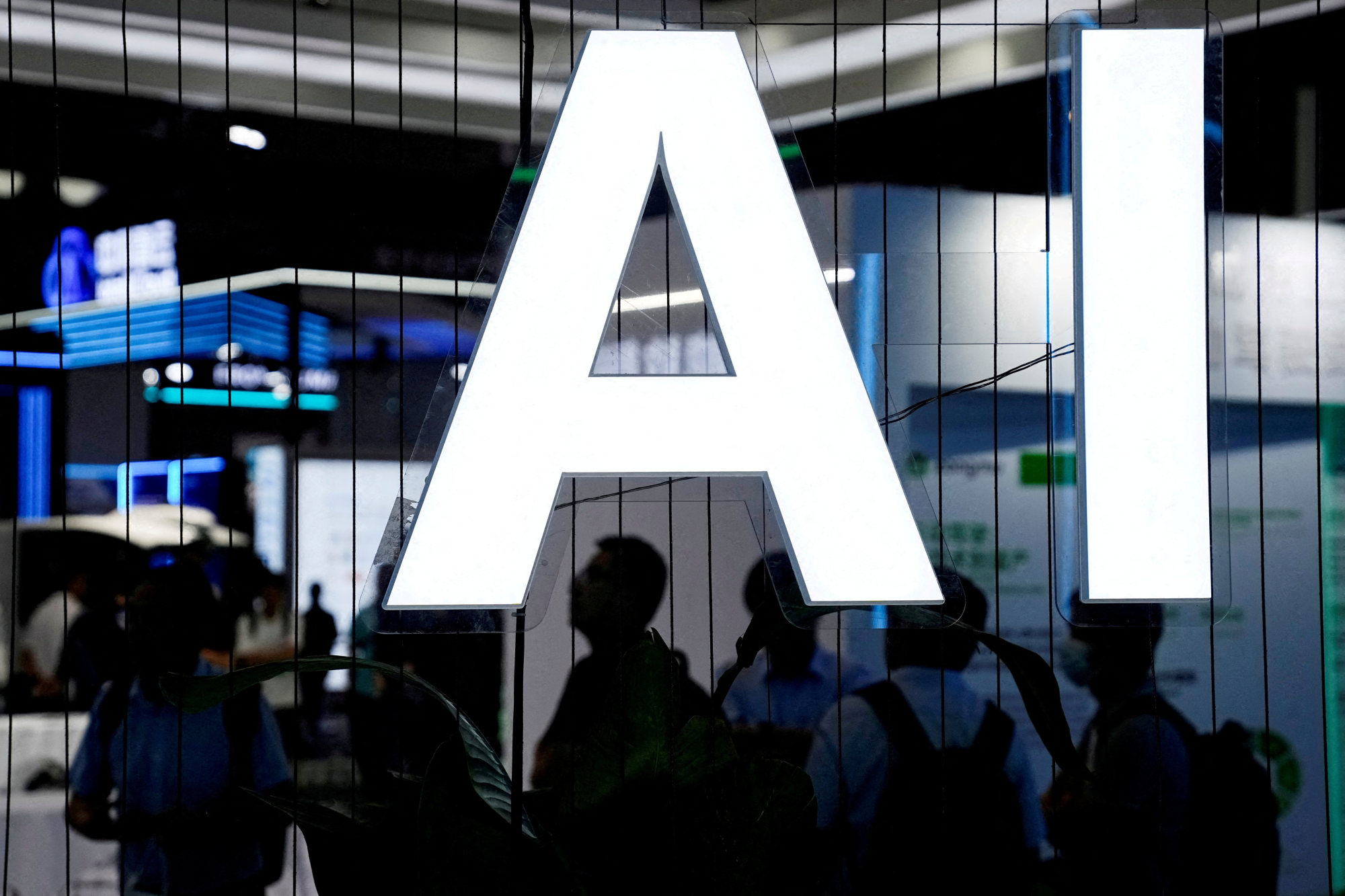China and the US are in a battle over AI. Experts say this is just the start

[ad_1]

Observers say there are now growing indications that rivalry in the emerging field is set to intensify, against a backdrop of heightened anxieties and distrust between the two superpowers.
Each country has its own competitive advantage and it is too early to determine how the AI battle will unfold, but some experts say Beijing and Washington should put aside their competitor mentality and take steps to cooperate – at least on some issues.
Heating up
In the latest signal that the rivalry is intensifying, US President Joe Biden last month outlined plans for fresh restrictions on investments American firms can make in Chinese entities, including in “certain artificial intelligence systems”.
There have long been signs suggesting how important a sector AI would be and how it could shape up to be a key arena of competition between the US and China.
The Chinese government in 2021 specified AI as one of seven “frontier technologies” to develop. And in July, China hosted the annual World Artificial Intelligence Conference in Shanghai, drawing 400 enterprises in what was a show of its ambitions.
Chinese tech firms have also poured growing resources into the space following the explosion of ChatGPT, the AI chatbot launched in November.
Analysts noted that both sides have attached increasing importance to developing AI – which could have a profound impact on their economic and power balance – and that recent developments could be just the start of a rivalry that is fast heating up.
Justin Sherman, a non-resident fellow at the Atlantic Council’s Cyber Statecraft Initiative, argued back in 2019 that AI would become more important for state power in the coming decades, particularly as it accelerates economic growth and improves military capabilities.
He wrote in an essay that AI would play an “important role in the balance of international power and the future of world order”, and that the nation with superior use of AI would set important global norms that could influence governance in countries around the world.
For China, at least, an analysis by McKinsey & Company predicted that AI could help buoy the Chinese economy by adding over US$600 billion in economic value annually, including in some sectors where it has lagged behind its global counterparts like transport and manufacturing.
In tumultuous tech war with US, China goes all in on computing power
In tumultuous tech war with US, China goes all in on computing power
Weifeng Zhong, a senior research fellow at the Mercatus Centre at George Mason University, said there had been greater emphasis placed on AI as it appeared to be the “natural next step” in the era of data.
“There are plenty of venues for extracting valuable intelligence on and making predictions about competitors and adversaries from the vast amount of data available in the public domain,” he said.
“This is of particular importance to Chinese intelligence against Western countries because using open sources has long been the first resort for Beijing whereas in the US, espionage (or human intelligence) is still taking the main stage.”
‘Tip of the iceberg’
Observers say that as the competition intensifies, the US is likely to ramp up efforts to maintain an edge over China.
Chris Meserole, director of the Brookings Artificial Intelligence and Emerging Technology Initiative, said the two powers simply “aren’t going to see eye to eye”, particularly on how AI should be developed and deployed.
“As a result the export controls announced last fall will be just the tip of the iceberg,” Meserole said, referring to Washington’s tech curbs introduced in October.
“What’s coming are outbound investment controls on AI start-ups in China, as well as measures meant to restrict access within China to advanced cloud computing services abroad and potentially even to leading-edge general purpose AI models.”
Matthew O’Shaughnessy, a visiting fellow of technology and international affairs at the Carnegie Endowment for International Peace, added that Washington was unlikely to “let up” on attempts to reduce China’s access to important inputs, such as advanced semiconductors.
He said the US had meanwhile been pouring money into AI research, talent and its semiconductor manufacturing sector.
The US has led the way in AI investment – it spent some US$26.6 billion in the year to mid-June, compared to US$4 billion for China, Bloomberg reported earlier, citing figures from consultancy firm Preqin.
The number of AI venture deals was also higher in the US but in terms of journal citations, China has been in front. The US appears to be leading the race when it comes to generative AI but China is ahead on image recognition.
Zhong from George Mason University pointed out that the AI rivalry between China and the US has so far been about computation, which involves machine learning using vast amounts of historical data to train an algorithm.
When the competition is about computation, China has an advantage as it has a large population and its government faces fewer constraints on data collection, he said.
But computation requires hardware such as advanced semiconductor chips, where the US and its allies excel in design and manufacturing.
“China is also becoming more defensive about its data advantages, implementing a series of cybersecurity [and] data laws meant to keep the voluminous data home and under the [Communist Party’s] control.”
Are US tech curbs the end of the road for better relations with China?
Are US tech curbs the end of the road for better relations with China?
According to Alfred Wu, an associate professor at the National University of Singapore’s Lee Kuan Yew School of Public Policy, China appears eager to compete with the US when it comes to cutting-edge technologies such as AI.
He said the rivalry could easily heighten as Beijing has the advantage of mobilising resources within the country into a particular sector.
“China has been preparing for [the competition] for a while but now they have become much more emboldened to push for the development of AI and other technologies,” Wu added.
‘Not much trust’
Both the US and China view AI as an important strategic technology – especially given the perceived leverage they could gain – but O’Shaughnessy suggested that there was currently “not much trust to draw on”.
“That makes for a challenging environment for agreements on things like military use of AI,” he said.
Wu was similarly sceptical that the world’s two largest economies could work together, especially when there has been a lack of agreement on other global issues such as climate change.
He said both sides had been wary of each other and the two governments were “constrained by domestic public opinion” amid a rise in nationalism.
According to Zhong, heightened tensions meant conflicts between the two countries were now more likely.
However, some experts suggest that there could still be certain issues Washington and Beijing could cooperate on.
O’Shaughnessy said this was particularly so as both sides struggled with a similar set of domestic policy questions – from the kind of transparency required from AI developers to the best ways to mitigate privacy risks.
“That probably won’t look like formal cooperation and the US and China probably won’t end up with the same approaches. But there’s plenty of room for Washington and Beijing to learn from each other’s regulatory successes and failures,” he said.
Meserole from the Brookings Institution, the American think tank, suggested that one potential area of cooperation was AI safety.
“Neither side has an interest in autonomous vehicles crashing, much less weapon systems misfiring. There’s a lot of room for joint action or information sharing around [that],” he said.
“China has always participated in the global cooperation and governance of artificial intelligence with a highly responsible attitude,” he told a UN Security Council meeting on artificial intelligence and security.
Wang Yiwei, an international relations professor at Renmin University in Beijing, said it was “only logical” for the US and China – two major powers leading the AI field – to work together.
“If China and the US do not cooperate, humankind will encounter huge difficulties in the governing and exploration of artificial intelligence,” he said.
Wang said that while the US was still ahead on AI, the development of new technologies in China had been rapid and it had the “most extensive market applications”, meaning there was room for “complementary cooperation” between private firms from the two countries.
But he said that if the US and China failed to cooperate on – and have control over – AI on the military front, there could be increased risk of an armed conflict.
A report released in July by the Centre for a New American Security think tank similarly warned that China’s advances in military AI could bring revolutionary changes and were likely to raise the risk of armed conflict with the US.
The report, which noted that AI played a “key role” in China’s military ambitions, comes as both countries are rapidly integrating the technology in their militaries and as tensions rise in the South China Sea and Taiwan Strait.
Wang said both powers needed to stop the rivalry from escalating into “vicious competition”.
“China and the US should be responsible to the world,” he said. “At this time, cooperation between China and the US should be aimed at the future of mankind, not only for the benefit of both sides.”
[ad_2]
Source link







